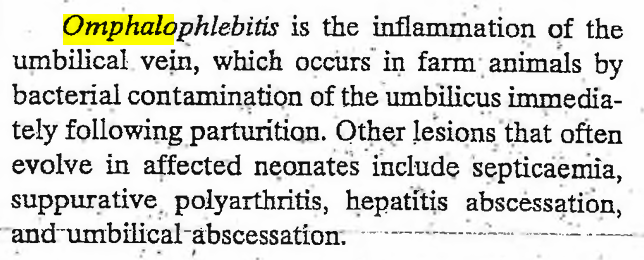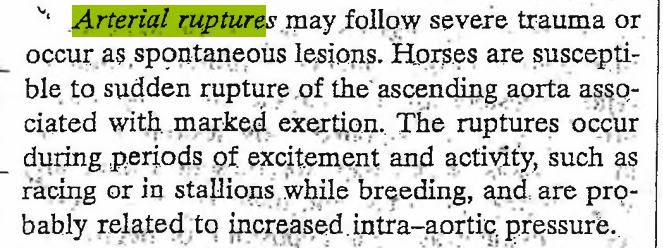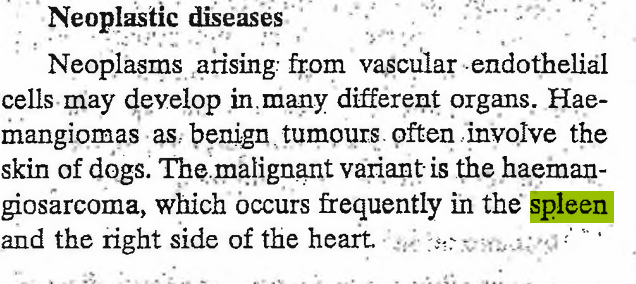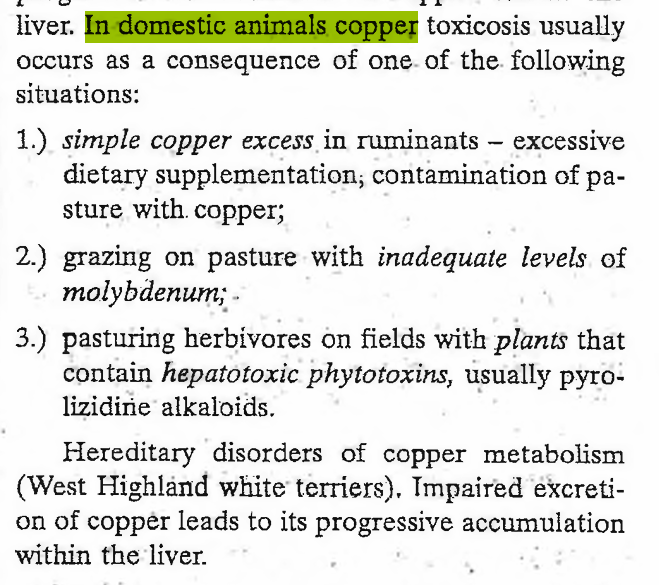PATHANAT MCQs 1 (S9)
1/135
Earn XP
Name | Mastery | Learn | Test | Matching | Spaced |
|---|
No study sessions yet.
136 Terms
Atrophic rhinitis is common in:
Swine-producing areas
Canine infectious tracheobronchitis presents with:
Absent, catarrhal or mucopurulent tracheobronchitis, enlarged tonsils and regional lymph nodes.
Bronchopneumonia is characterized by:
Irregular consolidation in cranioventral region
Lobar pneumonia can be:
Hemorrhagic, fibrinous, fibropurulent, necrotic or gangrenous (aspiration)
Rigor mortis occurs in myocardium and skeletal muscles. Emptying of ventricular walls and rigid left ventricle:
a. True b. False
True
Pulmonic stenosis is concentric hypertrophy in right ventricle due to pressure overload: a. True b. False
True/false (fant ingenting i boka som supporta dette)
Lymphocytic myocarditis occurs in puppies with parvoviral myocarditis: a. True b. False
True
Fibrinous pericarditis, the common type of pericardial inflammation in animals, is usually the result of lymphogenous infection: a. True b. False
True
The 2 forms of hypertrophy are:
Eccentric and concentric
Cor rugosum is thickened white, rough, shaggy masses… a. True b. False
True
from book “Grossly, the pericardial surfaces •are markedly thickened by white, often rough, shaggy masses of fibrous connective tissue (cor rugosum) with an accumulation of white to grey thick, foul smelling purulent exudate in the pericardial 'sac.” - suppurative pericarditis
Nasal tumors are common in:
Long-nosed breeds such as collie and german shepherd
Bacteria from omphalophlebitis can cause septicemia, fibrinous polyarthritis, hepatitis abscessation and umbilical abscessation a. True b. False
False - it is suppurative polyarthritis, not fibrinous

Arterial rupture may follow severe trauma or occur as bacterial lesions a. True b. False
False

Cardiac hemangiosarcomas are important neoplasms of dogs and may arise in the heart or represent metastatic lesions from sites such as the spleen a. True b. False
True

Myocardial necrosis
a. Appear pale initially, and may progress to prominent yellow to white dry gritty areas with dystrophic mineralization
b. Appear pale initially, and may progress to prominent yellow to white dry gritty areas with metastatic mineralization
c. Appear pink initially, and may progress to prominent yellow to white dry gritty areas with dystrophic mineralization
Appear pale initially, and may progress to prominent yellow to white dry gritty areas with dystrophic mineralization
Lipofuscinosis or brown atrophy of the myocardium occurs with severe cachexia but also has been described as a hereditary lesion in healthy pigs a. True b. False
True
Constrictive pericarditis is the term used to describe chronic inflammatory lesions accompanied by extensive fibrous proliferation and eventual formation of fibrous adhesions across the pericardial space
a. True b. False
True
Serous atrophy of fat is readily detected by the yellow gelatinous appearance in pericardial fat deposits a. True b. False
False
book: “serous atrophy of fat is readily detected by the GREY gelatinous appearance in epicardial fat deposits.
Endocardial fibroelastosis is characterized by
a. Diffuse endocardial thickening by collagen and elastic fibers, and left ventricular hypertrophy and dilatation in the absence of any associated cardiac malformation
b. Focal endocardial thickening by collagen and elastic fibers, and left ventricular hypertrophy and dilatation in the absence of any associated cardiac malformation
c. Diffuse endocardial thickening by collagen and elastic fibers, and right ventricular hypertrophy and dilatation in the absence of any associated cardiac malformation
Diffuse endocardial thickening by collagen and elastic fibers, and left ventricular hypertrophy and dilatation in the absence of any associated cardiac malformation
Regeneration of cardiac muscle cells is commonly observed a. True b. False
False
Postmortem blood clotting produces red clots in the artery, right ventricle, and large vessels at the base of the heart a. True b. False
true
Chylothorax is the accumulation of
a. Purulent fluid in the thoracic cavity
b. Milk-like lymph in the thoracic cavity
c. Serous fluid in the thoracic cavity
Milk-like lymph in the thoracic cavity
Primary mesenchymal lung tumor is
a. Anaplastic carcinoma
b. Lymphoma
c. Haemangiosarcoma
Haemangiosarcoma
In early bronchopneumonia, bronchioles and immediately adjacent alveoli are filled with
a. Neutrophils and sometimes an admixture of various amounts of cell debris, mucus, fibrin and macrophages
b. Lymphocytes and sometimes an admixture of various amounts of cell debris, mucus, fibrin and macrophages
c. Neutrophils and always an admixture of various amounts of cell debris, mucus, fibrin and macrophages
Neutrophils and sometimes an admixture of various amounts of cell debris, mucus, fibrin and macrophages
Bronchopneumonia refers to the inflammation of the bronchi, bronchioles, and alveoli that is bronchitis - bronchiolitis plus exudation into alveoli a. True b. False
True
Pulmonary ischemia occurs following emphysematous or fibrotic attenuation of alveolar capillaries and can be associated with severe reduction in blood volume a. True b. False
True
Acquired atelectasis occurs in several ways
a. Compression atelectasis, obstructive atelectasis, local atelectasis
b. Compression atelectasis, obstructive atelectasis, congestive atelectasis or shock lung, hypostatic atelectasis
c. Congestive atelectasis or shock lung, hypostatic atelectasis, diffuse atelectasis
Compression atelectasis, obstructive atelectasis, congestive atelectasis or shock lung, hypostatic atelectasis
Squamous metaplasia of tracheal epithelium is a feature of
a. Vitamin E deficiency and severe selenium toxicosis
b. Vitamin A deficiency and severe selenium toxicosis
c. Vitamin A deficiency and severe iodide toxicosis
Vitamin A deficiency and severe iodide toxicosis
In atrophic rhinitis grossly
a. There is atrophy of the turbinate and sometimes other bones of the nasal area and sinuses, as well as irregular hypertrophy of some areas as a secondary response
b. There is atrophy of the turbinate and always other bones of the nasal area and sinuses, as well as irregular hypertrophy of some areas as a secondary response
c. There is atrophy of the turbinate and sometimes other bones of the nasal area and sinuses, as well as regular hypertrophy of some areas as a secondary response
There is atrophy of the turbinate and sometimes other bones of the nasal area and sinuses, as well as irregular hypertrophy of some areas as a secondary response
Inflammation of the nasal passages is called rhinitis and of the sinuses, sinusitis. These usually occur together although mild sinusitis does undetected a. True b. False
True
Haemorrhage originating within the nasal region is most commonly caused by traumatic, inflammatory or neoplastic breakdown of vessels a. True b. False
True
Hydrocoele is an accumulation of serous fluid in testis a. True b. False
true
specifically - accumulation of serous fluid in the tunica vaginalis
Most lobar pneumonias are serous – purulent in character
a. True b. False
False
most are fibrinous
Engorgement toxaemia is an acute atony of the rumen that occur consequently to engorgement on proteins and lactic acidosis
a. True b. False
False
to engorgement on CARBOHYDRATES and lactic acidosis - true
Cirrhotic liver is characterized by follow features:
bridging fibrous septa from delicate bands to broad scars replacing multiple adjacent lobules,
exchange between hepatocytes and sinusoidal blood is not impaired,
parenchymal nodules formed by reparation of hepatocytes with different sized,
ongoing damage and reorganization of the hepatic connective tissue
a. True b. False
False - as exchange between hepatocytes + sinusoidal blood is impaired?
Agents frequently isolated from the endocarditis are Actinobacillus pyogenes in cattle, and streptococcus species and Erysipelothrix rhusiopathiae in pigs a. True b. False
True
Osteopetrosis (metaphyseal dysplasia) is characterized by accumulation of primary and/or secondary spongiosa in the marrow space and often by abnormalities of the bones of the heads a. True b. False
True
Epitheliotropic lymphomas are a subset of cutaneous B cell lymphomas a. True b. False
False
Porcine stress syndrome-malignant hyperthermia
– is believed to be a cellular defect in the handling of phosphorus ions, which results in activation of myofibrillar ATP-ase and rapid intracellular glycolysis with a consequent increase in body heat
a. True b. False
false - as PSS is not from defective phosphorous ion handling, it is rather a defect in the handling of Ca ions inside muscle cells.
Orchitis may be interstitial, parenchymatous and degenerative a. True b. False
false
it can be interstitial (interlobular), intratubular or necrotizing
Plasma cell neoplasms arise mostly in the bone marrow, where extensive proliferation of tumours can interfere with haemapoiesis and erode endostal bone to produce focal osteolysis a. True b. False
True
Callus is a raised area of subcutaneous thickening that develops because of friction in a localized area usually over pressure points on bony prominences or on sternum a. True b. False
True
In domestic animals copper toxicosis usually occurs as a consequence of one of the following situations:
simple copper excess in ruminants,
grazing on pasture with inadequate levels of lead,
pasturing herbivores on fields with plants that contain hepatotoxic phytotoxins, usually pyrrolizidine alkaloids
a. True b. False
False

There are four phases of lobar pneumonia: stage of congestion, stage of red splenization, stage of grey splenization, stage of resolution
a. True b. False
false
it is stage of congestion, stage of red Hepatization, stage of Grey Hepatization, stage of resolution
Clinical signs of pneumothorax include respiratory distress, and the result is simply emphysematic lung
a. True b. False
false
clinical signs incl. resp. distress but the result is SIMPLY ATELECTATIC lung.
Sprue or celiac disease is caused by an abnormal sensitivity on the part of intestinal crypts to a particular dietary ingredient, gluten a. True b. False
False
it is on the part of villous epithelial cells to a particular dietary ingredient, gluten.
Passive congestion of the spleen arises as a result of disturbances in the systemic and portal circulation and is a feature of some of the acute haemolytic anemia
a. True b. False
true
Carcinoma of the mammary gland may arise from the overlying skin, from the ducts or from the acini a. True b. False
False
cannot arise from skin
Cutaneous nonepitheliotrophic lymphomas are large-cell lymphomas of the dermis and subcutis and are heterogenous group with respect to immunophenotype
a. True b. False
True
The skin lesions are more common in association with
a. Leydig cell tumors
b. Sertoli cell tumors
c. Seminoma
b. Sertoli cell tumors
Hydrocephalus is
a. The occurrence of normal quantity of cerebrospinal fluid in hypoplastic skull
b. Complete or almost complete absence of cerebral hemisphere
c. Increased accumulation of cerebrospinal fluid
c. Increased accumulation of cerebrospinal fluid
Hypertrophic pulmonary osteopathy is
a. Progressive bilateral thickening of distal portion of the limbs
b. Progressive bilateral thickening of dorsal portion of the limbs
c. Progressive unilateral thickening of distal portion of the limbs
a. Progressive bilateral thickening of distal portion of the limbs
Epitheliogenesis imperfect means hereditary absence of skin and commonly also the mucosae a. True b. False
True
Metaplasia is a transformation of tissue a. True b. False
true
transformation of one differentiated cell type to another
Dysplasia means a normally developed cells; there is only a loss of the normal structural orientation of the tissue a. True b. False
False
Haemorrhage is
a. The escape of blood from vascular compartment
b. Local increased volume of blood in particular tissue
c. The formation of inappropriate structure of blood elements in vessels
a. The escape of blood from vascular compartment
Shock generally progresses through three different stages
a. Nonprogressive, progressive and irreversible
b. Reversible, nonprogressive and progressive
a. Nonprogressive, progressive and irreversible
Mesothelioma is
a. A rare malignant tumor
b. A frequently malignant tumor
c. A rare semi-malignant tumor
a. A rare malignant tumor
Choriocarcinoma arises from
a. Myometrium
b. Germ cells
c. Trophoblastic cells
c. Trophoblastic cells
Leukemia is more consistent feature of
a. Lymphosarcoma
b. Myelogenous leukaemia
c. Plasma cell sarcoma
b. Myelogenous leukaemia
Astrocytoma
a. Less common form of primary intracranial tumors
b. Most common extracranial tumor
c. Most common of primary intracranial tumors
c. Most common of primary intracranial tumors
Leucosis is
a. Myelocytes
b. Lymphocytes
c. Lymph nodes
b. Lymphocytes
Virus diseases by cytolysis; by maintaining a steady state with the host, by integrating into the genome of the host
a. True
b. False
True
The main requirement for the pathogenicity of an agent relate to its ability to enter the host by surviving on and penetrating mucous membranes, multiply in vivo, inhibit or avoid stimulation of the hosts defence mechanisms; damage the host
a. True
b. False
a. True
Steatosis or fatty degeneration is the abnormal/normal accumulation of triglycerides in the interstitium of parenchymatous organs
true/false?
a. True – [abnormal]
b. False – [normal]
Immune resistance is usually acquired through previous natural expose to an agent or through immunization but can be partly natural
a. True
b. False
a. True
Age resistance means that a particular agent may infect a young animal, and cause lesions, but be harmless or less harmful to an older animal of the same species, and the reverse may also occur
a. True
b. False
a. True
Noninflammatory oedema will occur when the following conditions are present:
an increase in intravascular hydrostatic pressure (local or generalized);
a fall in colloidal osmotic pressure in the plasma;
an impairment in the flow of lymph; the renal retention of salt and water
a. True
b. False
a. True
Mutualism means that the two live together without disadvantage to either, with most examples occurring in lower animals
a. True
b. False
a. True
During rigor mortis are muscles usually affected in a specific sequence; the trunk, jaws and then the extremities
a. True
b. False
b. False
appears first in the jaw, then passes to neck, trunk, and limbs
Calcification, gangrene, atrophy of the organs and regeneration – belongs to outputs of necrosis
a. True
b. False
true
The most accepted pathogenesis of a prion disease is
a. Autoimmune/allergic hypothesis
b. Protein – only hypothesis
c. Virion and virus hypothesis
b. Protein – only hypothesis
Canine seborrhea is characterized by
a. Defect in keratinization with decreased intensity of cells keratinization
b. Defect in keratinization with abnormal basal keratinization
c. Defect in keratinization with increased scale formation
c. Defect in keratinization with increased scale formation
Aseptic necrosis of bone has been associated with
a. Intramedullary tumors and various non-neoplastic lesions
b. Extramedullary tumors and various neoplastic lesions
c. Extramedullary tumors and various non-neoplastic lesions
a. Intramedullary tumors and various non-neoplastic lesions
Meningocoele means protrusion of
a. Meninges accompanied by brain tissue
b. Meninges and spinal cord
c. Meninges
c. Meninges
Epistaxis is bleeding
a. From the nose, it originates from sites other than the nasal mucous
b. Into the tracheal mucous, is most commonly caused by traumatic, inflammatory or neoplastic breakdown of the vessels
c. Into the nasal mucous, is most commonly caused by traumatic, inflammatory or neoplastic breakdown of vessel
a. from the nose, it originates from sites other than the nasal mucous
Neurons of the cerebral cortex die after an ischemic period of
a. 5-6 minutes
b. 1-2 minutes
c. 8-10 minutes
a. 5-6 minutes
Bronchopneumonia refers to the inflammation of the
a. Alveoli and pleura
b. Bronchi, bronchioles and alveoli
c. Trachea and bronchi
b. Bronchi, bronchioles and alveoli
Pemphigus is a.
a. Relatively common psychogenic dermatitis in dog
b. Multisystem disease characterized by the presence of B-cell hyperreactivity
c. Group of autoimmune diseases characterized clinical by different skin lesions
c. Group of autoimmune diseases characterized clinical by different skin lesions
Foot and mouth disease, vesicular stomatitis, swine vesicular disease, vesicular exanthema – belongs to vesicular bacterial stomatitis
a. True
b. False
false
not bacterial
Acquired atelectasis occurs in several ways: compression atelectasis, atrophic atelectasis, congestive atelectasis, hypostatic atelectasis
a. True
b. False
b. False
it is compression, obstructive, congestive and hypostatic
Two anatomical forms of myocardial hypertrophy are recognized; eccentric and atrophic
a. True
b. False
b. False
Endometriosis is a common condition in which actively growing endometrial tissues are explanted to aberrant sites within outside the uterus
a. True
b. False
a. True
Rickets and osteomalacia are characterized by failure of mineralization of none and cartilaginous matrix
a. True
b. False
a. True
Ulcers of a stomach is an excavation in the mucosa that does not penetrate through the muscularis mucosae
a. True
b. False
b. False
it does INDEED penetrate
Hepatosis dietica of sheep is syndrome of massive hepatic necrosis in association with its immediate or late effects, namely “brown fat disease”
a. True
b. False
b. False
it is a syndrome of acute hepatic necrosis that occur in rapidly growing swine. This is caused by deficiency of vit. E or Se.
Gallstones or choleliths are seldom observed in animals. They are concretions of normally soluble components of bile and are composed of a mixture of carbohydrates, bile pigments, salts of bile acids, calcium salts and lipid matrix
a. True
b. False
b. false
they are composed of a mixture of cholesterol, bile pigments, sediments of bile acids, calcium salts and a proteinaceous matrix!
Mineralization of endocardium occurs alone with vitamin D-toxicosis and as a result of intoxication by calcinogenic plants that contain vitamin-D analogues
a. True
b. False
a. True
Hydrosalpinx is distention of uterine tube by pus
a. True
b. False
b. False
it is caused by distension of the uterine by CLEAR fluid
The most common type of mammary growth arising in the dog are mixed tumors
a. True
b. False
a. True
In young animals, polyps and neoplastic lesions are very often the cause of intestinal intussusception
a. True
b. False
b. False
it is true for ADULTS
There are at least three general mechanisms which have been implicated in anaemias of chronic disorders: impaired marrow response to anaemia; iron sequestration in macrophages; and shortened erythrocyte survival
a. True
b. False
a. True
Degeneration of intervertebral disks is characterized by loss of water and proteoglycan, reduced cellularity, and an increase in collagen content of the nucleus pulposus so that the distinction between the nucleus pulposus and annulus fibrosus becomes difficult
a. True
b. False
a. True
Osteogenesis imperfecta is an inherited condition marked by abnormally brittle bones that are subject to fracture. Affected lambs and calves are normal in appearance but are unable to stand up
a. True
b. False
a. True
Gas gangrene of muscle is caused by clostridia, these bacteria exist as spores in the soil. For their germination and growth to the vegetative form, they require an acid environment low in oxygen tension
a. True
b. False
b. false
they require an alkaline environment low in O2 tension
Papilloma is a benign
a. Epithelial neoplasm growing from the surface
b. Mixed tumor
c. Epithelial gland-forming tumor
a. Epithelial neoplasm growing from the surface
The two principal mechanisms are included in acquired immunity; the production of humoral antibodies; cellular immunity (or delayed hypersensitivity)
a. True
b. False
a. True
Parasitic infection usually results from one of the following factors:
increase in effective masses;
altered susceptibility of animals;
introduction of susceptible animals into an infected area;
introduction of new vectors
a. True
b. False
a. true
Commensalism is a situation in which there is advantage to one partner but no real disadvantage to the other
a. True
b. False
a. True
Adenoviruses, poxviruses, papovaviruses, polymaviruses and herpesviruses are oncogenic RNA viruses
a. True
b. False
FALSE
they are oncogenic DNA viruses! - this group caus most benign tumors.